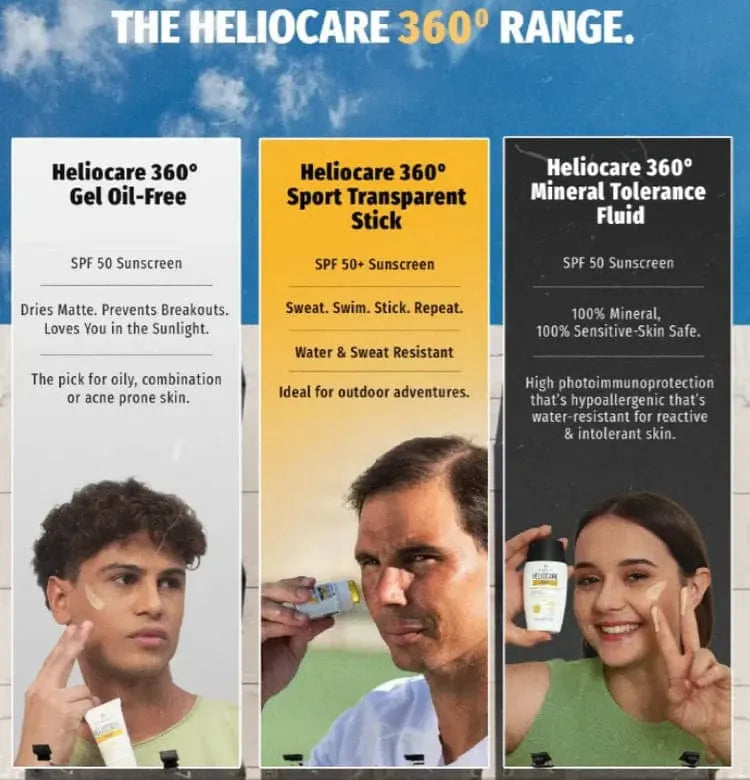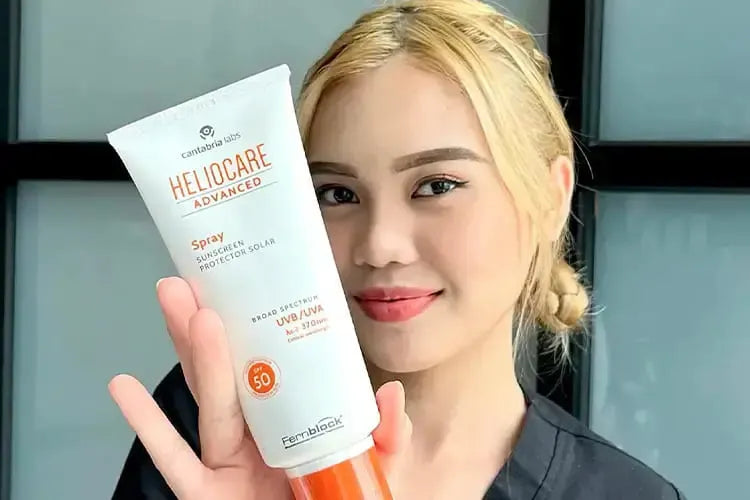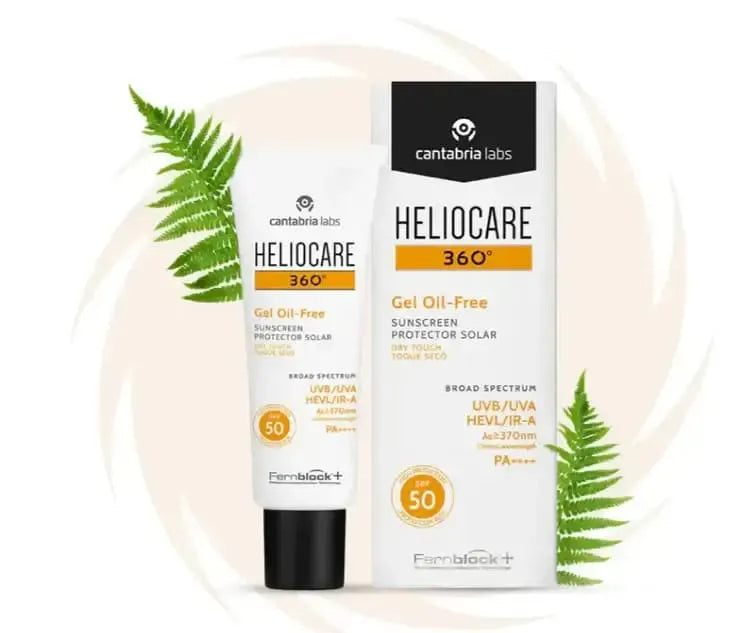Photoageing - The Hidden Enemy of Youthful Skin
Ever noticed those laugh lines becoming more prominent or your skin losing its youthful glow? This is the reality of 'mature skin' - not defined by a specific birthday, but by visible signs of ageing that affect each of us differently. To fight these signs, you've perfected your anti-ageing routine with retinol, collagen serums, and whatnots, but what about daily sun protection? The truth is - the #1 cause of skin ageing isn't stress or bad sleep, it's sun exposure. That's what we call Photoaging, and it's the bane of your youthful appearance. Believe it or not, 90% of visible skin ageing results directly from Ultraviolet (UV) light exposure, while 10% of skin changes arise from Infrared (IR) radiation and Blue light. The good news is - Photoageing can be completely avoided with diligent sun protection and proper skincare, in contrast to normal chronological ageing that occurs naturally over time.
Let's examine how sun exposure, especially UV rays, triggers the formation of fine lines, sagging, wrinkles, and other telltale signs of ageing skin, while also discussing what key aspects to consider when selecting a high-performance sunscreen for mature skin and premature ageing.

The Science: How Sun Exposure Accelerates Skin Ageing
The sun emits four major types of skin-damaging rays, including UVA, UVB, IR, and Blue Light.
Let's analyse how each of these four radiations causes photoageing at a cellular level:
-
UVA rays reach deeper into the dermis, damaging collagen & elastin → fine lines & wrinkles
-
UVB rays damage the outer epidermis → sunburns, tanning, and a rough skin texture
-
Blue Light infiltrates the dermis → hyperpigmentation & uneven skin tone
-
IR rays reach the deepest layer, hypodermis → inflammation & hydration loss
- UVB, IR, and Blue Light trigger free radicals → Oxidative stress with subsequent skin tissue damage
Among these, UVA (remember "A" for Ageing) reigns as the main villain in your skin’s ageing story. It penetrates through the skin’s outer epidermis and strikes deep into the dermis layer, destroying collagen and elastin fibres - the structural proteins that keep your skin supple, firm, bouncy, and youthful. The damage doesn't end there. Scientific research published in the National Library of Medicine reveals something even more alarming: UV exposure triggers your body to produce matrix metalloproteinases, specialised enzymes that further break down collagen, elastin, and other essential skin matrix components.
When collagen and elastin diminish, your skin's ageing story begins - sagging appears, age spots emerge, texture roughens, and wrinkles deepen. Exposure data reveals that 95% of midday UV rays are UVA, making them 500 times more intense than UVB rays. As a result, skin ageing is considered more predominant among the list of sun-damage effects on skin.
Even more concerning? Unlike UVB rays blocked off by glass windows, UVA rays effortlessly penetrate window panes, slowly ageing your skin whether you're outside in the garden or inside relaxing on a sofa. This all-pervading nature of UVA rays means finding and consistently using a high-SPF sunscreen for mature skin isn't just a piece of beauty advice, it's the mantra of essential protection you need every single day.
As for the other rays in the spectrum - UVB, IR, and Blue Light - even if they don't directly break down the collagen in your skin, these rays work alongside UVA to trigger oxidative stress by increasing free radicals. The free radicals, in turn, damage healthy skin cells and speed up the ageing process. That's why a full-spectrum sunscreen for mature skin is crucial to maintain a protective shield against the entire range of harmful rays, from UVA and UVB to Blue Light and IR.
Up next, we'll unveil the most visible signs of photoageing that ruthlessly steal your skin's youthful feel.
The Harsh Reality: How Photoageing Hits Mature Skin the Hardest
Photoageing seems to show more pronounced effects on mature skin compared to other skin types, as natural ageing has already diminished the skin's protective defences and repair mechanisms against UV damage. resulting in increased breakdown of collagen and elastin. And contrary to popular belief, skin ageing isn’t just about dramatic forehead furrows, sagging cheeks, and deep wrinkles, as they show in movies. It is actually a quiet, persistent process that unfolds day by day - so subtle you barely notice its progress until it’s too late and you've travelled quite far along the journey. Here is what happens during skin ageing:
-
Wrinkles and Fine Lines: Your skin's precious collagen and elastin reserves are depleted with each moment in the sun, etching fine lines around your eyes and mouth, subtle scaling, and other visible markers of ageing.
-
Leathery Texture: Sun exposure disrupts your skin’s protective barrier, causing your skin to lose its moisture and become dehydrated & rough to the touch.
-
Age Spots: Prolonged exposure to UV rays triggers overproduction of melanin, leading to dark spots, hyperpigmentation, and uneven skin tone, which is especially pronounced in darker skin tones.
According to a study published in Cureus, dark skin with more melanin has an intrinsic SPF of ~13.4 as compared to light skin’s natural SPF of ~3.3. This, ironically, means that darker skin tones are more vulnerable to stubborn age spots and pigmentation that take forever to fade.
Loss of Skin Bounce: UV rays steal away your skin’s resilience and elasticity, causing it to sag and creating the perfect canvas for wrinkles to form.

The Qualities of a Perfect Sunscreen For Mature Skin
-
Full-spectrum protection: Beyond standard broad-spectrum protection against UVA and UVB rays, a full-spectrum sunscreen for mature skin offers comprehensive defence against the complete range of harmful sunrays (UVA, UVB, Blue Light, and IRA) and premature ageing.
-
Anti-Ageing Ingredients: Smart sunscreen selection means checking for added anti-ageing ingredients, such as antioxidants (vitamin E, green tea) or specialised age actives (serine, trehalose). This approach ensures your skin receives protection while actively fighting signs of ageing.
-
Hydration: Dehydrated skin is highly susceptible to wrinkles - this isn't an opinion, it's a scientific fact. Sunscreens infused with Hyaluronic Acid and other skin hydrators deliver moisture to the skin's deeper layers, maintaining suppleness and minimising fine lines.
-
Lightweight: Mature skin or not, thick and creamy SPF formulations weigh your skin down and may trigger breakouts. Instead, choose a sunscreen that’s lightweight and blends effortlessly into your skin while maintaining powerful protection.
-
Gentle and Non-Irritating: Your skin deserves clean protection. Choose formulations free from parabens, alcohols, and harsh chemicals that can irritate sensitive, mature skin and compromise its natural immunity.
-
SPF 30 or Higher: For mature skin, dermatologists consistently recommend sunscreens with an SPF rating of 30 or higher to ensure robust protection against the sun's ageing effects.
-
Water Resistant: Check if the sunscreen for mature skin is labelled as water resistant. Water-resistant formulations offer another layer of security, ensuring your protection remains intact during swimming and unexpected rain showers.
The above qualities form the basic foundation of an excellent sunscreen for mature skin. But why settle for the basics when something exceptional exists? After all, meeting expectations is what everyone does, but surpassing those expectations is what legends do.
And we have just the legend in mind, Love. The revolutionary SPF formula dermatologists and skincare experts stand behind:

Meet Heliocare 360º Age Active Fluid - Trusted & Recommended by Top Dermatologists Worldwide
Imagine anti-ageing sun protection so good that dermatologists all over the world recommend it not just as the first defence against photoageing, but also as a repair system for the existing signs of skin ageing. Yes, we’re talking about Heliocare 360º Age Active Fluid, the ultimate sunscreen for mature skin, delivering benefits far beyond superior protection. At its core, Age Active Fluid is powered by the patented Spanish Fernblock®+ technology that offers full-spectrum defence while actively repairing prior UV damage, boosting skin’s natural immunity, and preventing and correcting photoageing and hyperpigmentation.
What’s more, Age Active Fluid is infused with the transformative Triple Anti-Ageing Complex containing Hyaluronic Acid for remarkable firmness and lasting hydration, Serine for collagen boost and improved barrier support, and Trehalose for preventing oxidative damage. Completing this masterpiece, the revolutionary Soft Focus Technology instantly blurs the appearance of wrinkles and bestows a delicate, radiant glow.
The benefits don’t stop there. Equipped with a specialised Biopolymer Net, Age Active Fluid creates a powerful barrier against environmental pollutants that accelerate ageing. Even better, its water- and sweat-resistant formula stays perfectly in place through swimming sessions and intense workouts alike.
When we look at how Age Active Fluid stacks up against other sunscreens for mature skin, the advantages become strikingly clear.
|
Heliocare Age Active Fluid |
Others |
|
Fernblock®+ technology for superior protection |
No cutting-edge technology |
|
Full-spectrum defence (UVA, UVB, IR, and HEVL) |
Only broad-spectrum defence (UVA & UVB) |
|
High photoimmunoprotection |
Basic protection |
|
Sweat & water resistant |
Only water-resistant or none |
|
Boosts skin’s natural immunity |
Doesn’t boost the skin’s immunity |
|
Repairs past UV damage |
Only protects, never repairs |
|
Anti-pollution defence |
No defence against pollution |
|
Triple anti-ageing complex |
No special anti-ageing ingredients |
|
Instantly blurs the appearance of wrinkles |
No blurring effect |
|
Silky texture, invisible finish |
Leaves a white cast with residue |
How to Choose the Perfect Sunscreen for Mature Skin
Your sunscreen can only work its magic when you apply it faithfully with proper technique. And when it comes to skin ageing, sunscreen for mature skin isn't just a summer fling; it's a daily commitment, 365 days a year.
Here's how to maximise the benefits of sunscreen for mature skin:
-
Daily Use: UV rays never take a day off. Rain, shine, or home, these harmful rays can still reach deep inside your skin layers and break down the collagen within. So, yes, whether you're cosied up indoors or enjoying the outdoors, your SPF remains non-negotiable.
-
Timing is Everything: Always apply your SPF 15-20 minutes before venturing out. This little patience pays off big time, allowing the SPF formula to get absorbed properly and create that invisible shield your skin depends on.
-
Two-Finger Rule: For the face, use two fingerfuls of sunscreen and apply it evenly across your facial skin. Don't neglect those often-forgotten zones around the eyes and ears. They're just as exposed and vulnerable.
-
Reapply Every Two Hours: Your sunscreen's protective shield gradually weakens as the ingredients break down throughout the day. Reapplying every two hours reinforces your skin's defence system, ensuring consistent protection from dawn till dusk.
In Closing
Age is just a number, and ageing is optional with mindful choices - particularly the daily ritual of SPF defence. Selecting the right sunscr
een for mature skin doesn't merely protect against sun damage, it actively slows down the ageing process.
Your hard-earned wisdom should shine through your words, not your wrinkles.
Unveil your skin's ageless potential today!
Shop for Heliocare 360º Age Active Fluid






